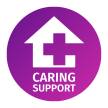Music Therapy For Our Mind And Ears - A Conversation With Music Therapist Jennifer Buchanan
Music Therapy For Our Mind And Ears - A Conversation With Music Therapist Jennifer Buchanan

March is Music Therapy Awareness Month so the Caring Support Podcast was excited to get the chance to sit down with Music Therapist and Executive Director of the Canadian Association of Music Therapists, Jennifer Buchanan.
Come along with us as we learn all about Music Therapy and how it just might be the right therapy choice for you or even the perfect career path.
Tell Us About Yourself.
Jennifer: It’s so interesting being asked that question because, okay, how young do we start? Thinking about what we're talking about today, I first started to look at music therapy when my Granny suggested it. I would have been around 16 or 17 years old and I had already spent time in music for most of my life. Public education was really, really good to me when it came to music opportunities. When my Grandad had a stroke, Granny would ask me to sing with him and with others. So, I had already seen some of these things we now see, which is that music can transcend a lot of challenges that people may be feeling. It can boost your mood, it can improve motivation. I'd already been seeing that. Then Granny came to me and she said, “Jenny,” - she's the only one who can call me that – “Jenny, have you heard about music therapy?” And I hadn't. We would watch a program together on television about it and soon I would apply to go to become a music therapist. I would complete my internship after school in Calgary, Alberta, and I have stayed here. I am originally from the Vancouver area. We're now a team of 20 Certified Music Therapists. Our youngest client is, two months old, our eldest is 104, and then also being the Executive Director of the Canadian Association of Music Therapists, I use a little bit of a different hat to support the greater efforts of the profession across the country. It's been a good journey so far, but there is still lots to do.
How Many Instruments Do You Play?
What a good question. I'd like to tell you millions of them, but I've got a lot of my colleagues that are definitely stronger in more of the instruments than I am. I've played a little bit of piano. I play guitar often. I came in as a vocalist and now use a wide array of percussion instruments, but we also use other things. We also use a metronome to help people with their gait or we might be using songbooks to do a lyric analysis and different worksheets. I do a lot of work around the power of a playlist for both in clinical sessions but also for people's own work. I would like to say I am much more therapist and administrator in so many ways than I am now a musician. Although, music truly is at the core of everything we do to establish a relationship with the people that we're at the bedside with, in the clinic room, or at the hospital with. In those scenarios, it is it really is about establishing that relationship through the music.
How Does One Become A Music Therapist?
Oh, I love this question so much. First of all, as I tell you about how to become a music therapist, I want to say that this portion of the program is for young people who are in junior high, high school, who are just starting to think about their future careers. It is also for the 40-year-old, the 50-year-old who are thinking about a secondary career because it can really come at different times in our life. I've seen many people of different ages and experiences come in at different ways.
We are fortunate to have education programs right here in Canada. We've got seven of them and you can find all the details at musictherapy.ca. These schools offer undergrads, as well as master's level programming when it comes to music therapy. Then you have 1000 hours of internship that we all do after that. Then there's a board exam. We write an actual board exam so we can become certified as Music Therapists. The acronym after our name after we complete that work is MTA. We always remind people to look for the MTA. Like any allied health profession, we do continuing education within our domains and we are constantly learning new things, especially because our scope of practice is so big. You may initially start by working in long-term care or with kids, and then later on in your life, you might be doing more within neurorehabilitation and mental health. So the scope is so broad and we're always needing more education.
What Is Music Therapy Month And What Is The Focus Of The Month?
Doing things like this, reaching new people, and sharing information with students and to people that might be thinking about going into music therapy as a profession. They may not realize that we have education programs across Canada. That's definitely a group we want to talk to. We also want to remember to talk to the public and educate them to let them know that if they are going through something and it's all of a sudden become a little more difficult than you were expecting or if you've been blindsided by something that has happened, perhaps you've had a stroke, a brain injury, or you're looking for rehabilitation, Music therapy is an option as part of the other traditional treatments and care that you can receive. We want to make the public aware that these are options. We also want to be speaking to the provinces. We're looking forward to eventually being able to give the public greater access to music therapy by accessing insurance that's going to cover that. In some provinces, we're regulated, in some others we are not, and we're looking to develop that. We're wanting Music Therapy to be a part of the conversation, a part of the health care conversation. That's what this month is all about. We want to thank Health Canada for having us listed as one of the special days of the month. It is terrific that they've included us.
What Is Music Therapy?
I've already told you how broad it is, so let's start with the relationship bit. At the end of the day, I'm a therapist and I am going to spend time with another human being getting to know them, hearing what their goals are, and creating a collaborative plan with them as to how they want to achieve their goals. A lot of them talk about looking at memory and focus. They're wanting to train their brains for memory and focus. A lot of people are going to be focused on motivation. They haven't been feeling productive. They've been overwhelmed and stressed out. Some people will connect with us for some mood support. Music can certainly do that.
Then there's going to be people that are looking to awaken some creativity, to just feel less isolated and to feel more empowered. All those things can happen as we do things like songwriting while we improvise on instruments together. You don't need a music background to do that as you start by identifying your favourite music, but then we go deeper than that, why is your favourite? What was happening when you were first hearing that? As we start going through different processes in order for you to achieve whatever ever those goals are, we're going to help you feel really safe and connected and to achieve those desired outcomes in the manner that you feel better.
Where Can More Information On Music Therapy Be Found?
You can go to musictherapy.ca and you're going to find other information there. You can also type in whatever your province is, plus music therapy, and you're going to get the provincial association. A lot of those places have ways for you to connect directly to the therapist of your choice. I really hope that somebody listening right now wants to give it a try and connect with the therapist so you too can live life with a greater sense of health and wellness and tap into this incredible resource we call and hear as music.
Is There Anything Else You Would Like To Tell Us About Today?
It's also Brain Health Month, which is very interesting. March is both of those things. Music is a big part of brain health as it reaches into all the different centres of our brain. I want to remind us all that mental health is health and music therapy is therapy. When these all come together, change is possible. If you are feeling like you need a little boost and need to try something different, Music therapy is a good one to give a try.
About Jennifer Buchanan
Jennifer is the Founder and Visionary Architect of JB Music Therapy (JBMT), a music therapy company that has been instrumental in the implementation of hundreds of music therapy programs throughout Canada for 30 years and that has been thrice nominated for the Community Impact Award by her local Chamber of Commerce. JBMT currently employs a diverse team of 18 Certified Music Therapists (MTAs) serving all ages in medical, education and community care settings.
Source: https://www.caringsupport.com/blog/music-therapy-for-our-mind-and-ears






Comments
Caring Support is not accepting comments at the moment
Want to show your support? Send them a one-off tip.